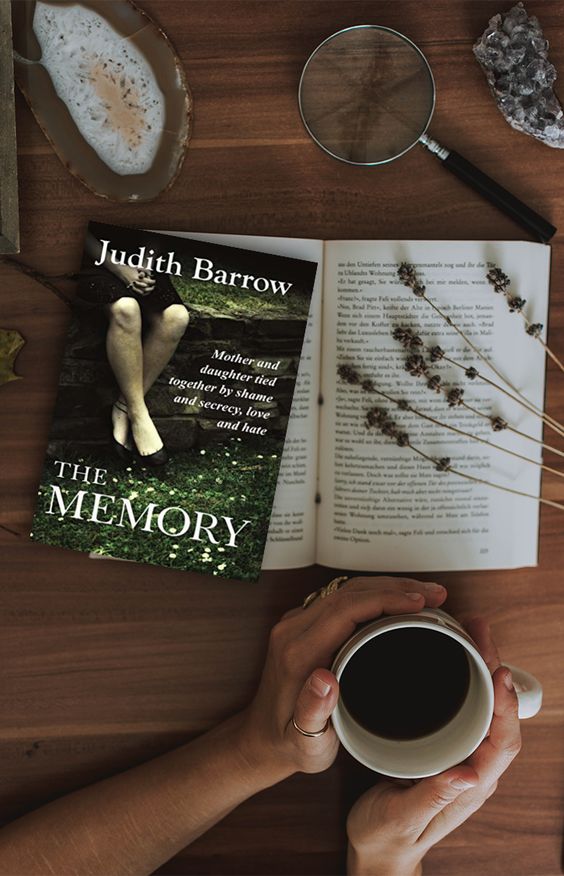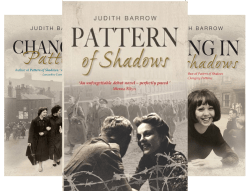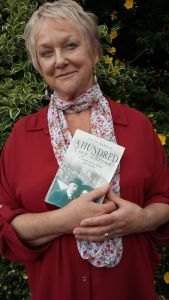In this feature, we ask our Crime Cymru authors to name six things that influenced their life and shaped them as a writer. This week, Wales Book of the Year Award shortlisted author Judith Barrow writes an extraordinarily powerful and moving account of a harrowing childhood experience.

Six of One
One book:
As a young child I remember reading The Tree That Sat Down. I had to search for this online, my copy has long gone. Basically, it was about an enchanted forest where Judy (guess why I liked the book!) helps her granny run The Shop Under the Willow Tree. They sell all sorts of lovely things, such as boxes of wonderful dreams fastened with green ribbon. But then Sam and the charming Miss Smith, who is a witch in disguise, open a rival business. I think what struck me then, something I mulled over for quite a while, was that people are not always what they seem. This also coincided with an event that left me very wary of people for a long time. I write more about this later.
One person:
The one person who encouraged me to write was my aunt: she always told me I could achieve whatever I wanted. When we moved to Pembrokeshire, she came with us. Eventually she developed dementia and I became her carer. I kept a journal so we could talk about what we’d done each day. After she died, I wrote a short story loosely based on our life together, which was accepted by Honno, for an anthology. Eventually, over some time, the story developed into The Memory. The Memory has been shortlisted for the Wales Book of the Year 2020.

One piece of music:
The Sound of Silence by Simon and Garfunkel. I’ve always loved this song, the lyrics are so evocative. And, without sounding too melodramatic, the following lines partly describe how I felt many times when I was growing up. “People talking without speaking. People hearing without listening”. But then I heard this cover version of some five years ago by Disturbed (https://bit.ly/2SPldlR). –The gravelly voice of David Draiman sends shivers down my spine each time I hear it. I want this played at my funeral. But not yet!
One event:
A writing weekend that was organised by Literature Wales. The weekend I was working on the final edit of Pattern of Shadows, the first of my Haworth trilogy. And where I met other writers who became friends. And where I discovered we all have moments of doubt in our skills as writers, doubts that anyone will like our writing, doubts that we will ever be published. And now, having kept in touch with them, have discovered we are all published. Wonderful!

One writer:
This has to be Eleanor Alice Burford Hibbert (1906–1993) who wrote under the various pseudonyms. I wrote an essay about her when I was studying for my Arts degree in my forties.
Eleanor was born in London, with a father who wasn’t particularly educated, but who passed on his great love of reading to her. She married in her early twenties to George Hibbert, who shared her passion for books. I always liked her quote about marriage. “I found that married life gave me the necessary freedom to follow an ambition which had been with me since childhood; and so I started to write in earnest.” I felt empathy with her words.
I first read her work when I was around twelve, at the time she wrote historical fiction as Jean Plaidy. Her stories were brilliant, fictionalized history of European royalty all researched and based on true history.
Then I discovered her as Victoria Holt, writing gothic romances set in the nineteenth century. They are usually told in the first person by young women drawn into a mystery, but always with a happy ending. Which was different from her work under her other pen name, Elbur Ford, when she wrote about real crime.
But my most favourite genre of her books was written under the pseudonym Philippa Carr – family sagas. Favourite because it’s what I love to read and write. Family sagas can encompass romance, mystery and crime. I do love a bit of crime, which is, I suppose, why my books are often described as “gritty”. Gritty is good! Well, I think so.
Eleanor Burford was at her typewriter when she died suddenly on January 18th, 1993, on a cruise ship. What a way to go!
One place:
Glen Mill. Glen Mill was the background for my Haworth trilogy. I find recent history fascinating; there have been so many changes over the last hundred years or so; it’s history but it’s still ‒ just – within living memory. But how these books started is a pure coincidence. I was researching for another novel when I came across Glen Mill, the first POW camp for Germans in WW2; a disused cotton mill in Oldham. I’ve spoken often about my memories of my mother being a winder in a cotton mill when I was very young, and Glen Mill caught my interest. I wondered how those prisoners would feel; what would their lives be like, how would they interact with the locals, if indeed they did. One thing led to another and, before I knew it, I was researching the whole of that era. I wanted to write about that time about a similar place. I knew there was always a hospital in every camp, and I wanted there to be a female protagonist. And so Mary Howarth, a nurse at the camp, came to life; I was hooked on her, on her family and their story. Pattern of Shadows was the result. The sequel, Changing Patterns, seemed a natural follow-on. But then I knew that the next generation would also be affected by the actions of their elders in one way or another, so Living in the Shadows, set in 1969, was published. But this family wouldn’t leave me alone. I wrote the prequel, A Hundred Thousand Threads. Set between 1910-1922, it’s the story of Mary’s parents, Winifred and Bill.
One experience:
This is something I mentioned above, when talking about the first book I remember. I was around eight at the time. One day, on my way home from Sunday School, I saw a man in the lane in front of me. Every now and then he would stop, move his head upwards in a strange way, as though listening. He had a white stick. He was blind. As I passed him, he held out his hand and asked if I knew of a particular avenue, if I would lead him there. His hand was large, soft, cool.
Every Sunday after that, there he was. I never made it past him; he heard me every time. Every time he insisted we held hands: to stop him stumbling, he said. He told me his name, asked a lot of questions: about my family, school, hobbies.
I asked my mother about him; she knew the family he was friends with, knew he always had Sunday lunch with them. I was reassured. It never occurred to me then that it was odd; he obviously knew the way to their house, if it was something he usually did.
One day he appeared at the railings of the school playground, shouting my name. He said he’d told my mum he had a book for me, to call at his house after school. Gave the directions.
I knew the minute I stepped into that living room, when he closed that front door that something was wrong. There were two other men in the room. He stood behind me, so I couldn’t leave. The curtains were drawn, the room dim. I tried to make an excuse, to leave, but he had hold of my hand. His hand was hot, sweaty.
No one spoke. The two men, bulky in jackets, holding hats on their laps. Their faces were turned towards me. Watched as he led me to a chair, pulled me onto his lap, jigged his knee up and down. I felt his reaction, even though I didn’t know what it was, what it meant. Still no one spoke. That was the first time I knew chilling, sickening terror.
Even now, as I write this, I can feel the fear. It’s an emotion I’ve recollected often in my writing, in my books, at certain times.
The outcome was, I suppose, inevitable. I wet myself. I felt the hot wetness flood out of me and onto him. He pushed me off his lap. I fell to the floor, stood, stumbled to the front door. The lock was higher than me, I jumped, banged my hand against the latch. Panicked. I heard his stick tapping against furniture. The door opened and I ran.

Read more about Judith Barrow on her website and her Crime Cymru page.
You can see Judith’s books on her Amazon page.
Reblogged this on Judith Barrow.
LikeLike
Powerful and brave.
LikeLiked by 1 person
Reblogged this on Thorne Moore and commented:
Understanding a fellow author can be enlightening, but also painful, as Judith Barrow’s account proves.
LikeLiked by 1 person
Thank you, Thorne. Always a great friend.
LikeLike
That last experience was horrific – and thank heavens you made it out of there. All of these experiences give a strength to writing and your writing is powerful and vivid. xx
LikeLiked by 1 person
This was such a powerful read, Judith. Your experience was horrific. Thank heavens you wet yourself – it probably saved you from a horror even worse. But the rest of your post was impressive. Thank you for this. It’s a great concept!
LikeLike
Alex, many thanks.As always your support is so appreciated. xx
LikeLiked by 1 person
Totally agree with Alex Craigie. You had a remarkable escape, Judith. So vividly described, like the rest of your powerful writing. Thank you for sharing so much. Fascinating! Onwards and upwards dear pal. XX
LikeLike